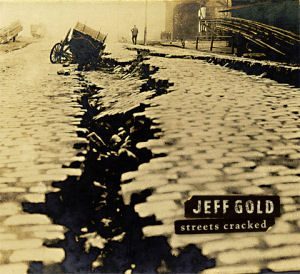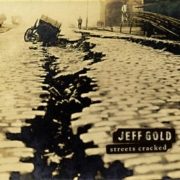JEFF GOLD – STREETS CRACKED
TITLE: STREETS CRACKED
ARTIST: JEFF GOLD
LABEL: WINDYAPPLE RECORDS
RELEASE DATE: FEBRUARY 18, 2014
The Power of Critical Thinking:
 As a freshman at UCLA in 1965 I had the good fortune to study American History with Professor Donald Meyer, author of the new book and now modern classic The Positive Thinkers, an analytic survey of the predecessors to Norman Vincent Peale’s bestseller The Power of Positive Thinking. He demonstrated that the sources of Peale’s panaceas ran deep in our culture, from popular religious figures like Mary Baker Eddy to politicians like Ronald Reagan, from 19th Century snake oil salesman to medicine show entertainers to modern TV preacher/hucksters like Jim and Tammy Faye Baker. Dr. Meyer counseled a wry skepticism towards such gospels of wealth and materialism disguised as Christian values and made an alternative case for the Power of Critical Thinking to combat its promise of a one-dimensional view of individual success with counter-cultural values like community, spiritual fulfillment and the good life.
As a freshman at UCLA in 1965 I had the good fortune to study American History with Professor Donald Meyer, author of the new book and now modern classic The Positive Thinkers, an analytic survey of the predecessors to Norman Vincent Peale’s bestseller The Power of Positive Thinking. He demonstrated that the sources of Peale’s panaceas ran deep in our culture, from popular religious figures like Mary Baker Eddy to politicians like Ronald Reagan, from 19th Century snake oil salesman to medicine show entertainers to modern TV preacher/hucksters like Jim and Tammy Faye Baker. Dr. Meyer counseled a wry skepticism towards such gospels of wealth and materialism disguised as Christian values and made an alternative case for the Power of Critical Thinking to combat its promise of a one-dimensional view of individual success with counter-cultural values like community, spiritual fulfillment and the good life.
I hadn’t thought of Dr. Meyer’s expanded ideal of the pursuit of happiness in many a year until I cracked open Jeff Gold’s new CD Streets Cracked and listened to a riveting body of songs that perfectly captures the spirit of Meyer’s critique of The Positive Thinkers. I also realized that at the same time historian Donald Meyer was researching his book a new generation of songwriters were similarly reshaping the landscape of popular song with a folk sensibility that seriously challenged the easy banalities of 1950s pop music.
West Hill singer-songwriter Jeff Gold stands proudly in this tradition; an honors graduate of Richard Farina’s Been Down So Long It Looks Like Up to Me School of Songwriting. Professor Leonard Cohen—our most prolific composer of music to commit suicide to—directed his honors thesis, Jeff Gold’s second CD Streets Cracked. Prof. Cohen’s Anthem of imperfection says:
Forget your perfect offering
Ring the bells that still can ring
There’s a crack in everything
That’s where the light gets in.
That’s even a tad more optimistic than Jeff Gold is, however; and that’s saying something, because Cohen is usually seen as the bellwether of the downcast.
The specific crack Jeff Gold writes about in his title song was caused by the1989 Oakland earthquake, during the third game of the World Series. However, that is not the only crack on the album. It is rather emblematic in that most everything he sees looks splintered, broken (in the vein of yet another faculty member of this school—Dr. Bob Dylan’s lament Everything Is Broken).
The surprising thing is I found it all quite refreshing—because I have been inundated recently with a barrage of positive thinking songs at local hoots—epitomized by one balladeer’s persistent denial of any hard feelings towards a woman who broke his heart—he summed it all up in the sunniest possible terms:
I loved you when you were with me
And I loved you letting you go.
John Lennon wrote Gimme Some Truth. Give me Hank Williams’ Cold Cold Heart or I’m So Lonesome I Could Cry. Give me Jeff Gold’s clear-eyed portraits of people who don’t live up to your expectations. Jeff is an urban troubadour who writes and sings The City Blues, honest to the bone about his feelings; that’s all that matters.
In Streets Cracked, tires don’t turn, doors don’t open, cold hearts don’t melt, and this songwriter doesn’t lie; so Jeff Gold looks for salvation in the same place Prof. Meyer did, and an earlier art critic of the Renaissance Walter Pater did; in art and poetry and song; “to burn always with this hard, gemlike flame—that is success in life.” So even as Jeff documents the human tragedy of frustrated aims and hopes, of thwarted ambitions and failed love he revels in the unblinking songs they leave behind.
Full disclosure: Jeff Gold is a personal friend who I met during an unforgettable period of my life animated by the singular devotion I felt towards the host of KPFK’s radio salon Malibu Folk—Brian May, who was left a quadriplegic from polio by a tainted dose of Salk vaccine he had received as a child. He was given six years to live, and outlived his limited life expectancy by more than twenty. If anyone knew about the struggle to transcend personal limitations it was Brian. He became a recording engineer and with the help of both Peter Yarrow of Peter, Paul and Mary who bought and set up a home recording studio for him, and Cher—who bought him a converted fully motorized van he could operate with the limited use of his hands, made it possible for him to achieve his dream of producing a folk music radio program. He was also married to a living angel Lupe Mariscal who went from being his nurse to being his wife.
Through Brian (who invited me and many other local songwriters on his show and interviewed us like we were James Taylor and Carole King) I met Jeff Gold and became a part of his songwriting circle. We met on a regular basis at his home in the West Valley to swap songs and give each other encouragement to keep at it regardless of the results. It was a haloed part of my songwriting apprenticeship and had it not been for the tragedy of Brian May’s childhood polio would likely never have happened. After about five years of Brian’s devoted friendship he contracted post-polio syndrome—a return of the original symptoms and died from complications brought on by kidney failure. His entire circle of folk musician friends—including Jeff Gold and Peter Yarrow—came together in a touching memorial and farewell to his great spirit.
So it may be impossible for me to be objective about Jeff Gold’s music. This is an old friend talking, and what I am about to say gives me personal pleasure as well as a sense of professional satisfaction.
If you want to hear a great finger-style guitarist and authentic voice of America’s on-going folk music revival, a singer-songwriter who grew up in the heyday of the Greenwich Village Folk Revival, who still has the original concert poster of Bob Dylan’s first appearance at Gerdes Folk City displayed proudly in his living room, who stood on-line for six hours in the rain to get tickets to George Harrison’s Concert for Bangladesh at Madison Square Garden, and who was the hub of Greenwich Village West in the Valley, where he now owns and operates and teaches at West Valley Music Center, a wonderful music store and school, then you can do no better than pick up a copy of Jeff Gold’s new CD Streets Cracked. It belongs in no less a company than the heroes who inspired him to become a songwriter in the first place.
Jeff’s wife Holly Goldsmith did the graphic design for the album and it is a work of art in itself that captures the spirit of the music with a perfect cover photo from the San Francisco Historical Society that came out of the 1989 earthquake Jeff writes about in the title song. Holly’s album cover art is worth the 1000 plus words of this review.
Jeff Gold has assembled a stellar cast of supporting musicians—lead guitarist Mark Mugrage, bass guitarist John Thomas Heaton, percussionist Jim McGrath, bass player Mark Dann and vocalists Lucy Hagan and Brad Swanson—and like Emerson greeted Whitman’s Leaves of Grass I am happy to welcome this brand new work of the folk singer’s art and craft into the world. Jeff has produced many of his close friends’ albums, played guitar, clarinet and saxophone on them, and arranged the songs, so it’s high time he turned his attention to producing his own. These eleven songs are a welcome antidote to the simplistic platitudes and Norman Vincent Peale-inspired positive thinking that characterize so much of what passes for contemporary folk music today.
Jeff comes from an older tradition—and none of these songs would feel out of place in a collection of Child Ballads, which are filled with painful stories of relationships that don’t work, dreams that don’t come true, and families that don’t remind one of a Norman Rockwell painting. It’s the music that remains uplifting in spite of it, the elegance of what modern literary critic Cleanth Brooks called—after Keats—The Well-Wrought Urn.
Gimme some truth, John Lennon demanded; Jeff Gold listened, and has brought his own hard-won personal truths to bear in this finely wrought new album, Streets Cracked.
Brian May would have been thrilled—as would my old history professor Donald Meyer—as am I. And I heartily concur with our mutual friend music journalist Paul Zollo who, in his review of Streets Cracked, called Jeff’s album a modern classic.
In our most recent conversation Jeff told me about the one time he met Pete Seeger and his wife Toshi—at the first meeting of the Folk Alliance in Portland, Oregon many years ago. Jeff was hitching a ride into town and Pete and Toshi picked him up. Jeff could hardly believe it, and has treasured their brief encounter ever since. I bet Pete did too.
Jeff Gold is having a CD release party and concert for Streets Cracked this Saturday evening, February 22, 2014, at 8:00pm: West Valley Music Center, 24424 Vanowen Street, West Hills, CA 91307; 818-992-4142.
On Saturday, February 22, 2:30pm, Ross Altman and Len Chandler present Sing Out the News—A Social History of Broadside Ballads at the Silver Lake Library 2411 Glendale Blvd, L.A., CA 90039; 323-913-7451; free and open to the public.
The Positive Thinkers (1965) Popular Religious Psychology from Mary Baker Eddy to Norman Vincent Peale to Ronald Reagan by Donald B. Meyer is available in Pantheon.
Ross Altman has a PhD in Modern Literature; Ross may be reached at greygoosemusic@aol.com













